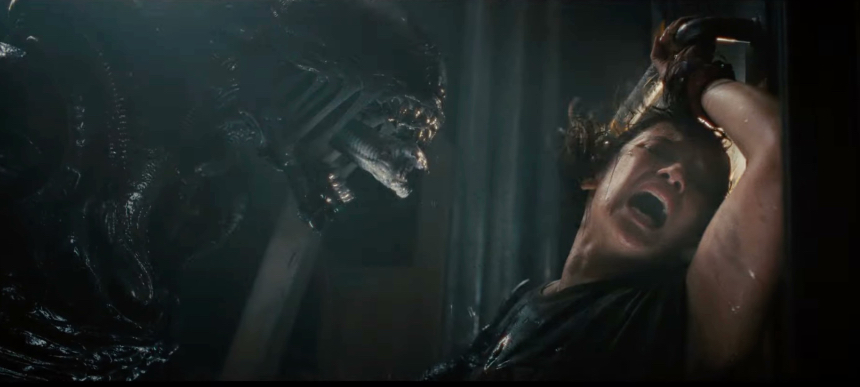ALIEN: ROMULUS Review: Fede Alvarez's Worthy Addition to the Series Almost Undone By Egregious Fan Service
Cailee Spaeny, David Jonsson, Archie Renaux, Isabela Merced, Spike Fearn, and Aileen Wu star in the sci-fi thriller, directed by Fede Alvarez.

After two stone-cold masterpieces (Alien, Aliens), followed by one middling, hopelessly compromised sequel (Alien 3) and another, bizarrely beautiful, deeply confounding entry (Alien: Resurrection), the Alien series went into a long period of hibernation.
It reawakened twice, for Ridley Scott’s loosely connected prequels, Prometheus and Alien: Covenant, before once again slipping back into suspended animation (a mooted sequel never materialized), the victim of underperforming box-office returns and the sale of 20th Century Studios to Disney Pictures (aka, the one major studio to “rule them all”).
IP (Intellectual Property) like the Alien series, of course, was never meant to go quietly into the good night. Instead, a second — or third by some counts, a fourth by others — resurrection was all but a certainty.
It was not “if” but “when” and that “when” is now under writer-director Fede Alvarez (Don’t Breathe, 2013’s Evil Dead). A skilled horror director with a penchant for genre extremes, Alvarez was a curious choice to take the reins of a big-budget science-fiction entry like the Alien series, but at least for the first 90 minutes of Alien: Romulus, a midquel or interquel set between the events of Alien and Aliens, he proves himself a worthy heir to Scott, Cameron, and Fincher’s varying contributions to the series.
Long before an egregious fan-service storm hits, Alien: Romulus opens in an incredibly promising fashion, focusing initially on Rain Carradine (Cailee Spaeny, Civil War, Priscilla), a 20-something worker stuck on a sunless, rainswept mining colony far away from the Earth the series has yet to visit. As in previous entries, the titular monsters remain the parasitic, acid-for-blood, all-consuming xenomorphs, but the villains are all too human: Weyland-Yutani, the mega-corporation that seemingly rules — and runs — every corner of the human-controlled galaxy.
As imaginatively envisioned by original writers Dan O’Bannon and Ronald Shusett and director Ridley Scott, Weyland-Yutani represents a dark, cynical vision of the future, one where representative government (democracy), if it exists at all, functions primarily to serve corporations and their unfettered greed for worlds, resources, and profits, leaving those at the bottom like Rain and her adopted brother, Andy (David Jonsson), struggling to survive on a near barren world and an infinitely corporate contract.

It’s in those early, despairing moments — likely to be dismissed by some fans as too slow or unnecessary world-building — where Alvarez’s cautionary vision, built on the filmmakers who preceded him, shines through the most, and it’s a bleak one. Rain and her circle, including sometime/onetime boyfriend, Tyler (Archie Renaux), his sister, Kay (Isabela Merced), his best friend, Bjorn (Spike Fearn), and the latter’s significant other, Navarro (Aileen Wu), have been effectively abandoned by whatever adults brought them to the colony (most presumably dead) and the mega-corporation that exploits them.
But an entry in the series isn’t an Alien film without the obligatory face-huggers, chest-bursters, and, of course, xenomorphs, and that’s exactly what Rain and her unsuspecting friends encounter when they decide to borrow a surface-to-space shuttle and venture onto an abandoned space station slowly circling the colony before its orbit sends it into the planet’s rings and dissolution. Before the eventual turn into gory, grisly, gnarly body horror (i.e., the best kind), there’s a sense, however misplaced, of hope and optimism among the makeshift crew of the wayward shuttle.
Not surprisingly, the space station isn’t abandoned and, unexpectedly borrowing the first of several plot points from the much-maligned Alien: Resurrection, the monsters Rain and company find aren’t inadvertent or accidental, but entirely deliberate, once again the result of Weyland-Yutani’s utter disregard for human life except as it favors or benefits the company’s bottom line. Among too many callbacks, shout-outs, and references to the series to mention, xenomorphs as “perfect biological organisms” are not only mentioned in dialogue, it’s proven repeatedly once Rain and her friends unwittingly discover the space station’s secrets.
From there, it’s only a hop, skip, and a chest-burster to Alien: Romulus fully embracing its body-horror roots. Alvarez takes the “more is better” direction typical of sequels and stages a series of impressively terrifying set pieces inside the space station’s cavernous, labyrinthine interiors.
Leaning heavily on the functional, industrial appearance of Scott’s first entry (among others) for inspiration, Alien: Romulus credibly feels like an extension of the future only glimpsed in the Scott-era entries. If anything, it feels like an open-world expansion pact of a heretofore never seen, heard, or experienced Alien-related videogame (i.e., a sequel to Alien: Isolation).
Beyond the lived-in production design, the near-perfect visual effects, or the impeccably cast 20-something actors, Alien: Romulus stumbles only when Alvarez and his collaborators over-indulge their proclivities for fan service and digital resurrections. An occasional reminder visually, narratively, or even thematically is more than acceptable, especially for a decades-old franchise that’s been strip-mined to near-oblivion, but far too often, nostalgia-fueled fan service becomes a crushing, unrelenting distraction, a distraction that repeatedly comes close to undermining Alvarez’s instincts, talents, and skills as a filmmaker and turning Alien: Romulus into the world’s most expensive fan film.
Alien: Romulus takes an inexplicably head-scratching turn for the worse in its final act when Alvarez and his co-screenwriter, Rodo Sayagues, lift one plot turn after another from one of the series’s justifiably under-loved entries. An ending fifteen, twenty, or even thirty minutes earlier would have delivered a much more emotionally, dramatically, and thematically satisfying ending. Unfortunately, it’s not, and whether responsibility falls to Alvarez, studio executives, or both, it’s still bound to leave an unnecessarily bitter aftertaste.
And yet for all of its misjudgments, missteps, and faults, Alien: Romulus almost miraculously manages to qualify as a better-than-average addition to a frustratingly uneven franchise. Opinions will vary, but calling Alien: Romulus the fourth and fifth best entry in the series (AvP I-II not included) shouldn’t be. More like this please, just without the obsessive necrophiliac nostalgia and digital resurrections next time.
Alien: Romulus opens throughout much of the world on Friday, August 16, only in movie theaters, via Disney Pictures.Visit the official site for ticket information.
Alien: Romulus
Director(s)
- Fede Alvarez
Writer(s)
- Fede Alvarez
- Rodo Sayagues
- Dan O'Bannon
Cast
- Isabela Merced
- Cailee Spaeny
- Archie Renaux







